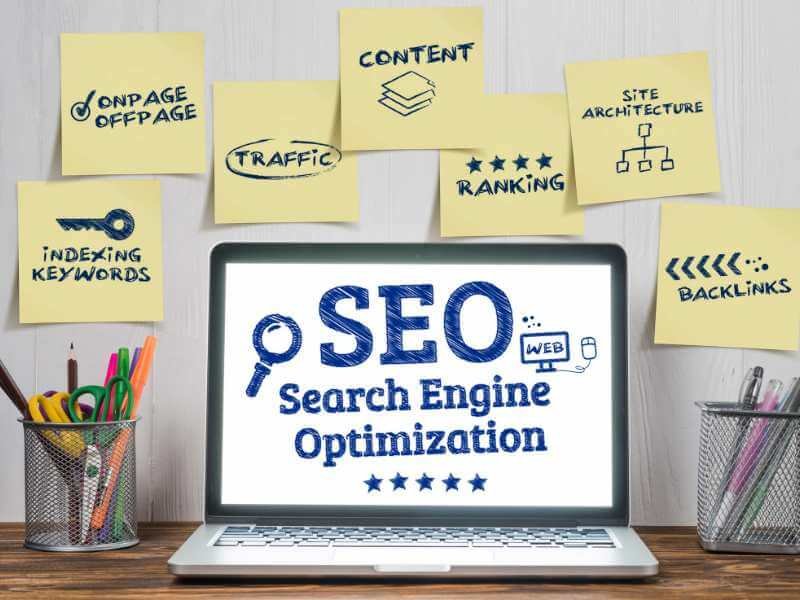SEO and Website Optimization Strategies for Success: The Importance of SEO and Website Optimisation
In today’s digital age, where the internet has become the primary source of information, online presence is crucial for businesses and individuals. However, more than simply having a website is required; it needs to be optimised for search engines to ensure that it ranks well and attracts the right audience. This article will delve deep into the importance of SEO (Search Engine Optimisation) and website optimisation and how they can significantly impact your online success.
What Is SEO?
SEO is the art and science of optimising a website to improve its visibility on search engine result pages (SERPs). It involves a combination of strategies and techniques designed to make your website more appealing to search engines like Google, Bing, and Yahoo. The ultimate goal of SEO is to increase organic (non-paid) traffic to your website, thereby boosting its online presence and credibility.

Keywords Matter
One of the fundamental aspects of SEO is keyword research. Keywords are the words and phrases people use to search for information online. By identifying and targeting relevant keywords in your content, you can ensure that your website appears in search results when users search for those terms.
The Art of Keyword Research
Keyword research is akin to the compass that guides your SEO journey. It’s identifying and selecting the words and phrases people commonly use when searching for information online. These search queries are the lifeblood of search engines, connecting users to the most relevant content available on the vast expanse of the internet.
The Power of Keywords
Keywords are the bridge between your content and your audience. They link what users search for with the valuable information you provide on your website. In essence, keywords are the foundation for your SEO strategy.
Relevance is Key
When conducting keyword research, the focus should be on relevance. It’s not about stuffing your content with as many keywords as possible; instead, it’s about identifying the most pertinent keywords to your industry, niche, or topic.
Long-Tail Keywords
In addition to primary keywords, long-tail keywords are crucial to consider. Users often employ longer and more specific phrases to find precise information. While they may have lower search volumes, they tend to have higher conversion rates because they reflect user intent more accurately.
Targeting the Right Keywords
Once you’ve compiled a list of relevant keywords, the next step is strategically incorporating them into your content. Here’s how you can effectively target the right keywords:

Content Alignment
Ensure that the chosen keywords align seamlessly with the content you’re creating. Your content should naturally revolve around these keywords, providing valuable and informative insights.
User Intent
Consider the intent behind each keyword. Are users looking for information, product reviews, or solutions to a problem? Tailor your content to match the user’s intent, as this will enhance the user experience and improve your search engine rankings.
Competitive Analysis
Analyse your competitors’ use of keywords. Identify which keywords drive traffic to their websites and assess their content strategies. This can provide valuable insights into which keywords are worth targeting.
On-Page Optimisation
Optimise various on-page elements, such as titles, headings, meta descriptions, and alt tags, with your target keywords. This sends clear signals to search engines about the focus of your content.
Content Is King
High-quality, relevant, and informative content is the cornerstone of SEO. Search engines prioritise content that provides value to users. Therefore, creating content that answers questions, solves problems, or offers valuable insights can help your website climb the search engine rankings.

The Significance of Website Optimisation
Website optimisation goes hand in hand with SEO. While SEO focuses on improving your website’s search engine visibility, website optimisation ensures that your site is user-friendly, loads quickly, and provides an excellent user experience.
Mobile Optimisation
With the increasing use of smartphones, ensuring your website is mobile-friendly is paramount. Search engines, including Google, now prioritise mobile-responsive websites in their rankings. If your site is not optimised for mobile devices, you could miss out on significant potential traffic.
Speed Matters
In today’s fast-paced world, users expect websites to load quickly. Slow-loading websites frustrate visitors and can lead to higher bounce rates and lower search engine rankings. Optimising your website’s speed can profoundly impact user satisfaction and SEO performance.
User-Friendly Design
A clean and intuitive website design is crucial for retaining visitors and encouraging them to explore your content. A cluttered or confusing layout can lead to high bounce rates and discourage users from returning to your site.
How SEO and Website Optimisation Impact Your Online Success
Now that we’ve covered the basics of SEO and website optimisation, let’s explore how these factors can significantly impact your online success.
Increased Visibility
Effective SEO strategies can propel your website to the top of the search engine rankings. When your website appears on the first page of search results, it receives significantly more visibility and traffic. This increased exposure can lead to more leads, conversions, and, ultimately, more revenue.

Credibility and Trust
Users often perceive websites that rank highly in search results as more credible and trustworthy. People tend to trust search engines, and if your website consistently ranks well, it can boost your online reputation.
Competitive Advantage
In today’s competitive digital landscape, your competitors are likely investing in SEO and website optimisation. You can gain a competitive edge in your industry by staying ahead of the curve and implementing effective strategies.
Better User Experience
Website optimisation benefits your search engine rankings and enhances the user experience. A well-optimised website loads quickly provides easy navigation, and offers valuable content, ensuring visitors interact positively with your site.
Conclusion
In conclusion, the importance of SEO and website optimisation cannot be overstated. These two essential elements work together to improve your online visibility, credibility, and user experience. By investing in SEO and optimising your website, you can take significant steps towards outranking your competitors and achieving online success.
Remember that SEO and website optimisation are ongoing processes that require dedication and expertise. If you want to thrive in the digital landscape and stay ahead of the competition, it’s crucial to prioritise these practices and adapt to the ever-changing SEO landscape.
Are you ready to take your website to the next level and boost your online presence? Start by implementing effective SEO strategies and optimising your website for success.




